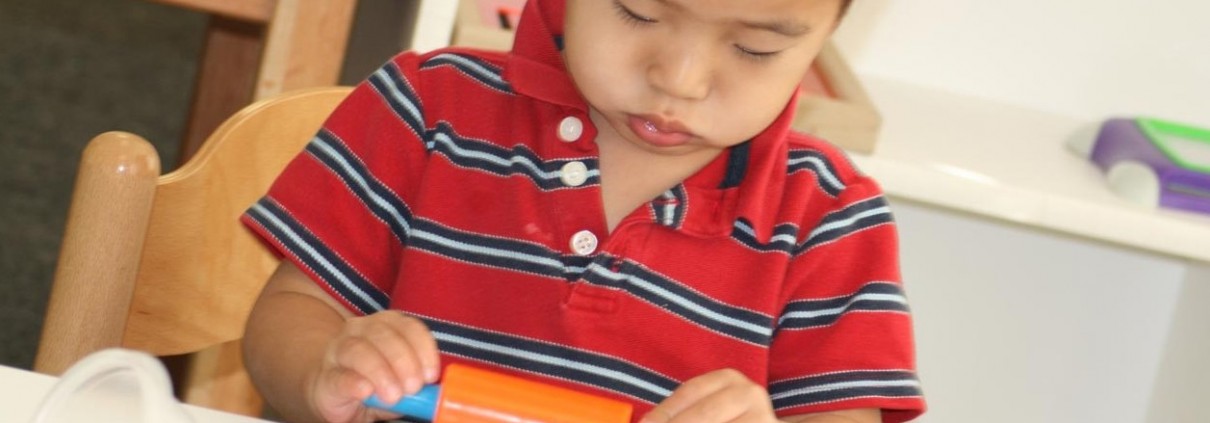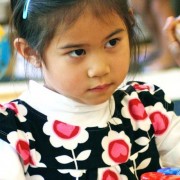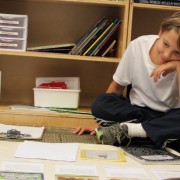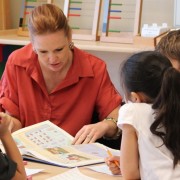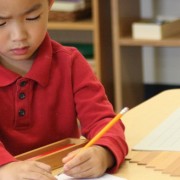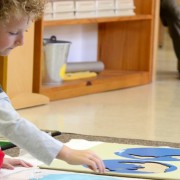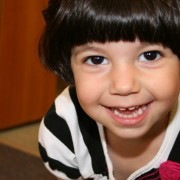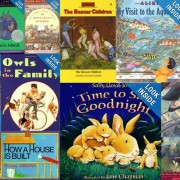A Surprisingly Non-Academic Approach to Strong Academics
When parents tour our Montessori schools, we often hear questions about academics: when will my child read? How do you teach math? Will your program get my child ready for Kindergarten? In this competitive world, parents of toddlers are rightfully concerned with future academic success. And research supports this concern: children who start elementary school poorly prepared have a hard time catching up and diagnoses like ADHD have grown exponentially, even in the youngest students.
But does this mean you need to subject your toddler to programs like preschool prep or Baby Einstein, and enroll your preschooler in Kumon or similar preschool academics programs?
We think the questions and concerns about early academics are legitimate: a child’s experiences in his formative toddler and preschool years can have a significant impact on his future academic and life success. Poor preparation can, in fact, leave children behind, making it harder for them to achieve their full potential.
Montessori preschools do an exceptional job preparing children for academic success. Montessori children start their elementary career ready to flourish: most learn to read in our age 3-6 classroom, and solve arithmetic problems into the thousands. But the important point is how. Montessori children do not learn by drill-and-kill memorizing of flash cards, or repeatedly watching academic videos, or completing endless worksheets.
Montessori schools approach academics in a surprisingly non-academic way, laying strong foundations for self-motivated, successful learning as early as in the toddler program. Much of what we do is what Maria Montessori called indirect preparation: toddlers and younger preschool students engage joyfully in activities that impart a wide range of prerequisite skill which then, down the road at age 5 or 6, enable an almost explosive growth in academic achievement. Here are some examples of this indirect preparation for academics:
- The ability to concentrate. ADHD diagnoses have grown by over 5% per year in the past years; about 12% of all boys ages 5-17 have at some point in time been diagnosed with ADHD, which can severely impact a child’s ability to function in life and in school. While there is no consensus on what causes the disorder, ADHD symptoms include an inability to sustain focus on a task for extended periods of time. Treatment often includes programs that help children learn better executive function skills. Learning to concentrate on an activity, to immerse oneself fully in a chosen task, is one of the most important goals for a child who enters a Montessori preschool or toddler class. In Dr. Montessori’s words, “The first essential for the child’s development is concentration. The child who concentrates is immensely happy.” When your child joins the Montessori toddler program, we offer him activities that appeal to him, and then give him the freedom to work with a chosen activity for as long as he likes. In this environment, even 18-month old children regularly focus for 10, 15, even 20 minutes on one task. As your child progresses through the Montessori preschool sequence of activities, he’ll tackle increasingly more challenging, longer tasks. It’s not at all unusual for a 5-year-old Montessori child to spend an entire 3-hour work period engaged in one chosen task, such as tracing, coloring and labeling a map of Africa, for example.
- Developing executive function skills. A recent article in the New York Times explored the question of what really drives life success. One surprising discovery: being able to set goals, to self-motivate, to make mistakes, learn from them, and persevere in the face of challenges may well be more important than scores on academics or intelligence tests. Unfortunately, those are skills rarely taught, not in school and not in most preschool programs. Montessori is different. As early as the toddler program, Montessori children choose their own activities. However, there’s usually only on of each activity, so children learn to patiently wait their turn (no adult-enforced sharing happens in Montessori classrooms.) Children are free to make mistakes—indeed, Montessori encourages us to “become friendly with error.” Further, it’s usually the activity itself that shows them their mistake—water spills, a porcelain plate breaks, a tower doesn’t stand—and the children learn to pay attention to mistakes and learn from them (as against avoiding them for fear of being criticized by a teacher.) And as tasks get longer and more challenging, students learn to keep at it, often working on the same projects for several days at a time, not because a teacher instructed them to, but because they chose to do so. This internal discipline is precisely what life success requires, and what Montessori teaches so beautifully!
- Strong motor skills. Handwriting is an important skill a child needs to master to succeed in elementary school and beyond. Children who cannot write well often under-achieve against their potential. Motor skills (and several other skills, such as visual-perceptual skills) are supremely important in learning to write. Montessori toddler and preschool purposefully develops these foundational gross and fine motor skills. Scrubbing a table or cleaning the blackboard strengthens shoulder and arm muscles. Peeling an egg, scooping beans, pouring water from a small pitcher, making orange juice, squeezing a sponge: these all strengthen wrist muscles and control. A series of activities, from the Knobbed Cylinders to the Metal Insets, from pinning activities to puzzle maps, help children strengthen their fingers and develop a proper pincer grip for later pencil use.
- Oral language skills. A strong vocabulary and elaborate language is an important predictor of future success in literacy tasks. The Montessori toddler program builds these skills systematically. Children learn much vocabulary with matching object/card sets. Our highly educated Montessori teachers consistently use elaborate (age-appropriate) language. They may say things like “Sarah, I notice your pants are wet. They must feel very damp and uncomfortable on your skin. Shall we go and find you some dry, cozy pants to change into?” rather than “Oh, you had an accident. Time to change!” Of course, we read many stories, sing songs, and discuss daily events with each other. We also introduce toddlers beginning phonemic awareness skills: a teacher may hold up small objects, like a cat, a pan, and a mop, and have children identify the beginning sounds.
-
Earned self-confidence. In today’s age, many people talk about fostering children’s self-esteem. All too often, that means lavishing praise upon toddlers for every action they take. Unfortunately, research has shown that empty praise not only fails to foster real self-confidence, it in fact can inculcate an anti-effort mindset. In Montessori, we don’t play this game. We are convinced that self-confidence must be earned by real personal achievements, resulting from sustained effort. That’s why we present lessons step-by-step, and set our students up to explore, practice, and earn mastery. When they do succeed, we don’t offer empty praise. Instead, we help them appreciate their real-world achievement by offering up what Montessori calls a point of interest: “Notice how when you put the cup down slowly, without making a sound, the water stayed in it”, or “See how straight the mat stands in the basket when you roll it tightly?” When this is repeated frequently, over a child’s years in the Montessori toddler, preschool and elementary school programs, children learn that with effort, they can master tasks. They come to enjoy the struggle to master tasks, and don’t fear the natural failures that are part of the learning process.
Self-esteem doesn’t contribute much to success. But success contributes mightily to self-esteem. Kids have to “do” something, and do it well, to get a self-esteem boost. Madeline Levine, PhD, in Teach Your Children Well
Just imagine your child, at the end of his third year in Montessori preschool: he’ll be able to look around the class and all the materials in it. He’ll know that when he first entered the class, all these activities were strange, challenging, and maybe even a bit intimidating. But now, as a 6-year-old, he knows he has mastered them. Can you see the earned pride in his eyes—and the confidence that this real achievement will give him as he enters elementary school?
The discipline that we are looking for is active. We do not believe that one is disciplined only when he is artificially made as silent as a mute and as motionless as a paralytic. Such a one is not disciplined but annihilated. We claim that an individual is disciplined when he is the master of himself and when he can, as a consequence, control himself when he must follow a rule of life. Dr. Maria Montessori, in The Discovery of the Child

